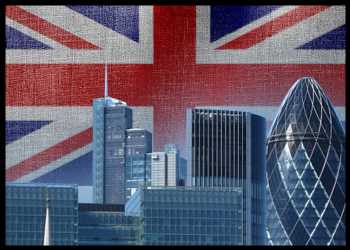
UK Economy Headed For Long Recession? Revised GDP Fall Signals Hard Times Likely
December 22, 2022The UK economy contracted more than estimated in the third quarter on downward revisions to industrial and construction output, vindicating the start of a long recession.
The quarterly decline in gross domestic product was revised to -0.3 percent from -0.2 percent, revised data from the Office for National Statistics showed on Thursday.
The production-side breakdown showed that the marginal growth in services output was offset by declines in industrial production and construction.
Services output grew 0.1 percent, which was revised up from flat output estimated previously.
On the other hand, industrial output shrank 2.5 percent versus the prior estimate of 1.5 percent decline. There was a fall in manufacturing output of 2.8 percent. The construction sector shrank 0.2 percent instead of the initial estimate of 0.6 percent growth.
The level of real GDP in the third quarter was estimated to be 0.8 percent below where it was pre-coronavirus at the fourth quarter.
On the expenditure-side, household expenditure fell by a revised 1.1 percent, driven by declines in net tourism, transport, household goods and services and food and drink.
Meanwhile, government spending grew 0.5 percent, down from the first estimate of 1.3 percent. Although moderate, the quarterly increase reflects higher spending on public administration, and defence and education.
Gross fixed capital formation increased 1.1 percent, underpinned by 17.3 percent surge in government investment. Business investment was estimated to have fallen by 2.5 percent compared to the initial estimate of -0.5 percent.
Excluding the alignment adjustment, estimates showed that inventories fell GBP 5.2 billion in the third quarter as there were reductions particularly for retail and manufacturing industries.
The trade deficit for goods and services was 1.7 percent of nominal GDP in the third quarter.
Another report from the ONS showed that the current account deficit, when trade in precious metals is included, narrowed to GBP 19.4 billion, or 3.1 percent of GDP in the third quarter.
Earlier this month, the Bank of England had raised its GDP forecast for the fourth quarter of 2022 to -0.1 percent from -0.3 percent projected in November. The bank cautioned that there are considerable uncertainties around the outlook.
The economy is projected to remain in recession throughout next year and the first half of 2024, and to recover only gradually thereafter.
The Confederation of British Industry on Thursday said the decline in the private sector activity extended into December and the fall is set to deepen further next year.
The CBI growth indicator fell to -13 percent from -7 percent in November. Private sector activity has fallen for five consecutive rolling quarters.
Private sector activity is expected to fall at a faster pace in the next three months due to quicker declines in business and professional services and distribution.
Source: Read Full Article


